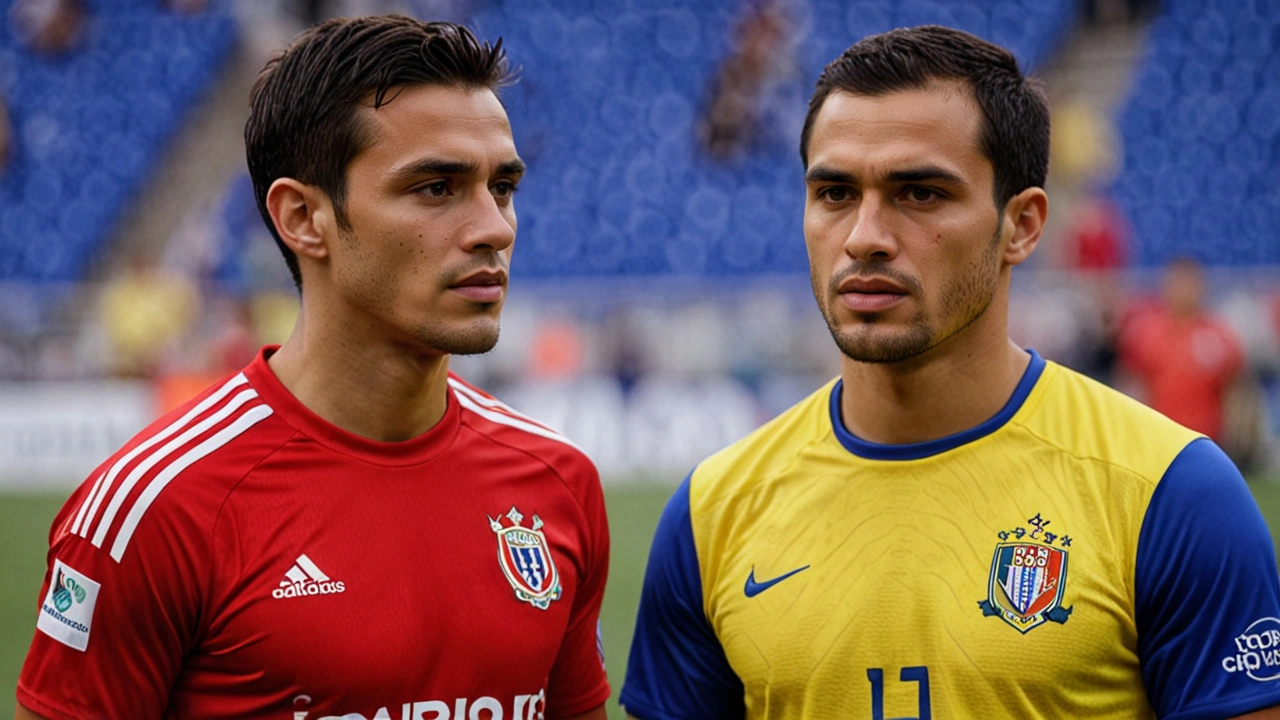Darwin Nunez Dodges Immediate Suspension Amidst Copa America Brawl Probe
In a dramatic turn of events, Liverpool's star striker Darwin Nunez has managed to avoid an immediate ban despite his involvement in a post-match brawl that threw the Copa America semi-final into turmoil. The ruckus ensued following Uruguay's bitter defeat to Colombia, sparking a ferocious and chaotic scene that is now under thorough investigation by South America's soccer governing body, CONMEBOL.
After the high-stakes match, tensions boiled over when Darwin Nunez, along with several other Uruguayan players, raced into the stands in a desperate bid to protect their families, who were reportedly being attacked by enraged Colombian fans. Eyewitnesses captured the intense confrontation on video, documenting Nunez and his teammates as they defended themselves and their loved ones from the violent outbreak.
As video footage of the incident spread across social media and news outlets, CONMEBOL promptly condemned the violence, emphasizing that football should be free of such intolerance and aggression. They initiated an investigation into the altercation, naming Darwin Nunez as well as 10 other Uruguayan players who played in the match. This list includes notable names such as Ronald Araujo, Mathias Olivera, Rodrigo Bentancur, Santiago Mele, Sebastian Caceres, Emiliano Martinez, Matias Vine, Brian Rodriguez, Jose Maria Gimenez, and Facundo Pellistri.
Despite the gravity of the incident, Darwin Nunez will not confront immediate repercussions, allowing him to participate in Uruguay's third-place playoff against Canada. However, the shadow of uncertainty looms large as the players embroiled in the controversy have until July 17 to submit their detailed statements to CONMEBOL.
The semi-final match itself was a fierce and tactically intense affair, leaving Uruguayan supporters disheartened. Frustration among the fans was palpable, and it sadly escalated into the unfortunate altercation post-match. As the Uruguayan players entered the stands, their priority was undeniably the well-being of their families, a natural yet dangerous reaction that now sits under the microscope.
CONMEBOL's statement emphasized the importance of setting firm disciplinary measures to curtail such actions in the future. While the investigation aims to provide clarity on the responsibilities and actions of each involved party, it also intends to reinforce the core values that the sport represents – respect, fairness, and unity.
In the broader context, this brawl brings to light the ongoing challenges of managing fan behavior and player safety in major sports events. Players are consistently under immense pressure and often find themselves at the mercy of emotionally charged environments. The governing bodies, clubs, and event organizers face the daunting task of ensuring that the sanctity of the sport is maintained both on and off the pitch.
As the investigation unfolds, the focus also shifts to the potential ramifications for the players if found guilty of misconduct. Disciplinary actions could range from fines and suspensions to more severe sanctions, depending on the outcome of the inquiry. Fans, meanwhile, wait with bated breath for the final verdict, aware that it could significantly impact the careers of some of their favorite players.
The Broader Implications for Football
This incident underscores the need for comprehensive measures to protect players and their families while upholding the spirit of competition. Incidents like these might prompt governing bodies worldwide to revisit their existing protocols for matchday security and player protection. While passionate support is integral to the sport, there's a thin line between spirited fandom and unacceptable aggression.
Instances where players are compelled to intervene personally underline the gaps that exist in current security arrangements. There might be a growing push towards enhancing security personnel training and deploying more resources to prevent such confrontations. Additionally, stricter penalties for fans engaging in violence could serve as a deterrent against future incidents.
The Role of Social Media and Public Perception
Another layer to this situation is the role of social media in shaping public perception. The rapid spread of footage showcasing the players' defensive actions can elicit diverse reactions from the public. Some might empathize with the players' instinct to safeguard their families, while others might critique their decision to engage directly with hostile fans.
Social media's influence is undeniable in modern sports narratives, magnifying every action and reaction. Clubs and players now need to be more mindful of their conduct, as their actions are often scrutinized in real-time. It places an additional strain on how they manage their public image, knowing that a single incident can ripple across millions of screens worldwide.
Future of Football Post-Brawl
Looking ahead, football as a sport will need to evolve continuously to address the challenges posed by such incidents. Governing bodies, clubs, and all stakeholders must collaborate to create a safer and more respectful atmosphere in and around stadiums. Football, with its global reach and cultural significance, has the potential to influence societal attitudes subtly yet profoundly.
As fans, our role extends beyond being mere spectators. We hold the power to shape the narrative through our actions and reactions. By promoting respect, fairness, and positive fandom, we can contribute to sustaining the sport's integrity and essence. The incident involving Darwin Nunez and his teammates serves as a cautious reminder that while passion fuels the game, it should never overshadow the principles of respect and sportsmanship.
While CONMEBOL continues with its investigation, the football community watches closely, hopeful for a fair and just resolution. The outcome may set a precedent, influencing how similar incidents are managed in the future.


Shruthi S
July 13, 2024 AT 13:26Unnati Chaudhary
July 14, 2024 AT 03:06deepika singh
July 15, 2024 AT 05:09Aniket sharma
July 16, 2024 AT 02:39Vijendra Tripathi
July 18, 2024 AT 02:31ajay vishwakarma
July 19, 2024 AT 21:59fatima almarri
July 20, 2024 AT 22:13Divya Johari
July 21, 2024 AT 00:59Pragya Jain
July 22, 2024 AT 08:21Neha Jayaraj Jayaraj
July 22, 2024 AT 15:32Disha Thakkar
July 23, 2024 AT 14:31Sreeanta Chakraborty
July 24, 2024 AT 12:35ankit singh
July 24, 2024 AT 23:24Pratiksha Das
July 26, 2024 AT 08:09amar nath
July 26, 2024 AT 10:51Abhilash Tiwari
July 27, 2024 AT 00:25devika daftardar
July 27, 2024 AT 01:51